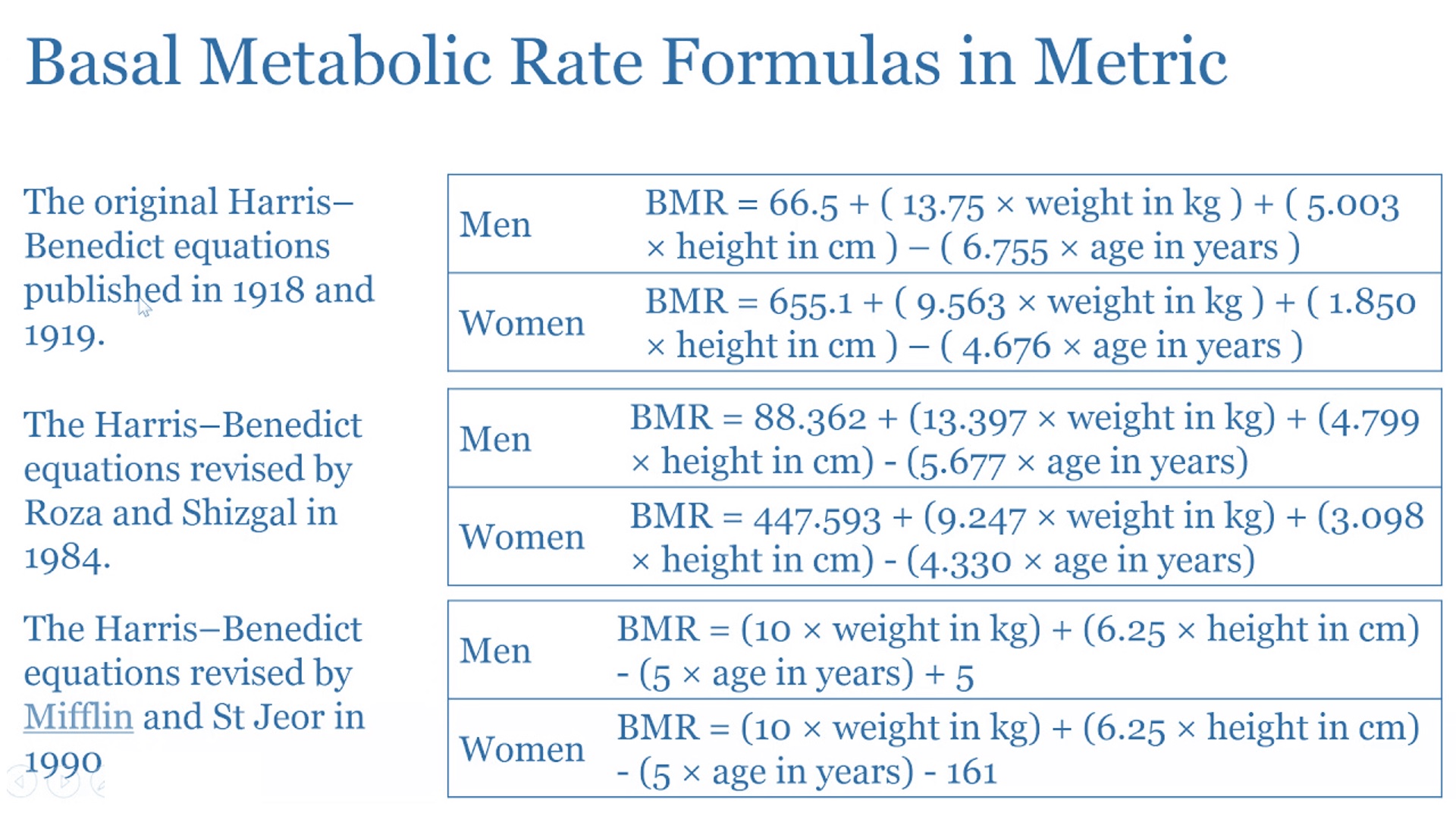How many calories do I need?
The number of calories you need depends on several factors, including your age, gender, activity level, weight goals, and overall health. There isn’t a one-size-fits-all answer, but here is a general idea of how to approach this:
- Calculate Basal Metabolic Rate (BMR): This is the number of calories your body needs to maintain basic functions at rest. There are different formulas to calculate BMR, such as the Harris-Benedict equation. BMR is influenced by factors like age, gender, weight, and height.
- Activity Level: Once you have your BMR, you need to account for your activity level. The more active you are, the more calories you’ll burn. The Harris-Benedict equation has different activity multipliers (sedentary, lightly active, moderately active, very active) to help you estimate your total daily energy expenditure (TDEE).
- Set Your Goal: Depending on whether you want to maintain, lose, or gain weight, you will need to adjust your caloric intake. Generally:
- To lose weight, create a calorie deficit by consuming fewer calories than your TDEE.
- To gain weight (muscle), create a slight calorie surplus by consuming slightly more calories than your TDEE, along with strength training.
- To maintain weight, consume roughly the same amount of calories as your TDEE.
- Monitor and Adjust: Keep track of your progress and adjust your calorie intake as needed. Weight loss or gain might not always proceed linearly, so be open to making changes.
- Nutritional Balance: While calories are important, the quality of your diet matters too. Focus on a balanced intake of macronutrients (carbohydrates, proteins, and fats) and include a variety of nutrient-rich foods like fruits, vegetables, whole grains, lean proteins, and healthy fats.
- Consult a Professional: If you are uncertain about the number of calories you should consume, or if you have specific health goals or conditions, consult with a registered dietitian or a gastroenterologist.
Remember that health is not just about calories; it’s about nourishing your body with the right nutrients and maintaining a healthy lifestyle. Your personal circumstances and goals play a significant role in determining your optimal caloric intake.
What is the Harris-Benedict equation?
The Harris-Benedict equation is a set of formulas used to estimate an individual’s Basal Metabolic Rate (BMR) and Total Daily Energy Expenditure (TDEE). These calculations provide an approximation of the number of calories your body needs to maintain its current weight based on factors like age, gender, weight, height, and activity level.
There are different versions of the Harris-Benedict equation, each with varying levels of activity:
- Harris-Benedict Original Equation:
- For men: BMR = 66.5 + (13.75 * weight in kg) + (5.003 * height in cm) – (6.75 * age in years)
- For women: BMR = 655.1 + (9.563 * weight in kg) + (1.850 * height in cm) – (4.676 * age in years)
- Harris-Benedict Revised Equation (also known as the Mifflin-St Jeor Equation):
- For men: BMR = 10 * weight in kg + 6.25 * height in cm – 5 * age in years + 5
- For women: BMR = 10 * weight in kg + 6.25 * height in cm – 5 * age in years – 161

Once you have your BMR, you can estimate your Total Daily Energy Expenditure (TDEE) by multiplying your BMR by an activity factor that represents your level of physical activity:
- Sedentary (little to no exercise): BMR * 1.2
- Lightly active (light exercise/sports 1-3 days/week): BMR * 1.375
- Moderately active (moderate exercise/sports 3-5 days/week): BMR * 1.55
- Very active (hard exercise/sports 6-7 days a week): BMR * 1.725
- Super active (very hard exercise/sports, physical job, or training twice a day): BMR * 1.9
These equations provide estimates and individual variations can occur. For accurate and personalized guidance, consulting with a registered dietitian or a gastroenterologist is recommended, especially if you have specific health goals or conditions.
Find at peptiko.gr a free online calculator of how many calories you should consume. Click here.
Also read:
Low-Calorie Foods and Snacks
Weight loss diets: How to lose weight fast
How can I contact gastroenterologist Dr. Zavos for an appointment?
Dr. Chris Zavos is a board-certified gastroenterologist and hepatologist, located in Thessaloniki Greece, and specifically in Kalamaria suburb, about 7 kilometres (4 miles) southeast of downtown Thessaloniki. His private office is at: Fanariou 8 street (near Aigaiou and Adrianoupoleos avenues), Kalamaria (Thessaloniki), Greece.
Thessaloniki International Airport is only 10 km away from his private office in Kalamaria and can be reached by taxi within 13 minutes from the airport.
Dr. Chris Zavos performs endoscopies at Bioclinic private hospital in downtown Thessaloniki (Mitropoleos 86 street).
You can contact Dr. Zavos at phone numbers: (+30)-6976596988 and (+30)-2311283833, or you can email him at czavos@ymail.com. Dr. Zavos responds to Greek and English languages.
